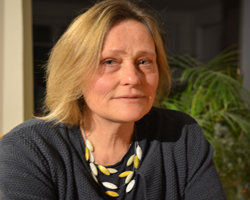Susanne Bjelbo, nurse and social worker, Copenhagen, Denmark

S. Bjelbo
Susanne Bjelbo
“As a nurse, I feel it is my responsibility to provide the best of care to my patients. This includes vaccination,” says Susanne Bjelbo, who has been working at the psychiatric clinic of Sankt Hans Hospital, in Copenhagen, Denmark, for the past 10 years.
Ms Bjelbo has dedicated her career as a nurse and social worker to caring for patients who have both substance use disorder and mental illness. Patients at the Sankt Hans psychiatric clinic are treated by a team of psychiatrists, psychologists, ergotherapists and nurses to ensure a comprehensive and inclusive approach to health care. Each is assigned to approximately 10 patients, all of whom are at least 25 years old. Ms Bjelbo says, “The form of treatment and care we offer to patients depends on many different factors, such as social background, state of mental health, type of substance use disorder and age”. Every session is different: “Not all of my patients are capable of coming here or they sometimes forget. In this case, I go to their house to check on them. Vaccinations I prefer to give at the clinic”. At every session or home visit, Ms Bjelbo checks her patient’s overall health status, which also includes a detailed conversation to ensure that medication has been taken properly, to monitor possible side effects of medications and lastly, to discuss outstanding vaccinations.
Utilizing routine health check-ups to reach vulnerable groups with vaccination
When asked about the role vaccination plays in her work, Ms Bjelbo says, “Although our main concern is to treat people with substance use disorder and mental health issues and to ultimately prepare them for reintegration into society, vaccination is crucial in terms of ensuring overall health and well-being”.
“Our patients clearly belong to specific vulnerable groups of Danish society – not only do they live with a mental health disorder, but they also use drugs, mainly cocaine and amphetamines. Only if they meet these two criteria, are they directly referred to us, as one of the only institutions in Denmark specialized in this combination of disorders.”
On vaccination, she elaborates: “As our patients are more vulnerable and susceptible to contracting a life-threatening disease, such as hepatitis, than others and belong to at-risk groups – some have HIV, others hepatitis C ¬– it is crucial to check whether they were fully vaccinated as children, but also to ensure that they get vaccinated for hepatitis A, hepatitis B, pneumococcal disease and influenza. Either myself, or the general practitioner in charge, advises patients on what vaccine is needed. If necessary, I also administer vaccines myself during home visits or at the clinic”.
Vaccination is not seen as a priority
When asked whether vaccine hesitancy is a barrier, Ms Bjelbo describes the following scenario: “Imagine that you live on the street, you have a mental health disorder and need cocaine on a daily basis. Vaccination will not be your utmost priority”.
To ensure that patients are vaccinated and that vaccination becomes a priority, Ms Bjelbo and her colleagues make optimal use of routine health check-ups. Although some patients claim “I do not get sick easily” as an excuse not to get a recommended vaccine, after a detailed conversation about the importance of vaccination for their overall health status, they usually agree and accept the shot.
The comprehensive approach to treating patients at Sankt Hans Hospital provides patients not only with overall health care, but also social support and psychological counselling – an approach that reduces barriers to immunization. Ms Bjelbo says, “By improving a person’s overall living conditions, you automatically make more room for vaccination to be seen as a priority and important for someone’s health and well-being”.



